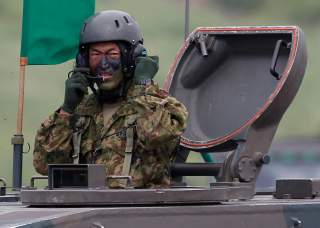Time to Let Japan Be a Regular Military Power
American officials have forgotten the purpose of alliances: defense, not welfare.
Beyond these major contingencies are smaller potential conflicts in which the United States should stay entirely clear: some mix of wars/strife/collapse involving Burma, Thailand, Cambodia, Vietnam, Indonesia, Malaysia and perhaps others. While such contingencies would be tragic and might be destabilizing, none would involve America’s vital interests and justify military intervention. Not every problem is America’s to solve.
Tokyo should take over its own defense. But shifting responsibility for Japan’s conventional defense is not enough. The United States should reconsider its nuclear umbrella as well. In defending Japan, Washington already is risking Los Angeles to protect Tokyo. If North Korea acquires the ability to hit the U.S. homeland, Uncle Sam will be doing the same again, only against a potentially more reckless power.
Obviously, Washington expects the threat of retaliation to deter attack. But if deterrence fails, as it often has in history, then war could invade the American homeland. And there’s no good reason to take that risk given Japan’s capability to arm itself. The Japanese people might be reluctant to go nuclear, but they can underinvest in defense with little ill consequence only so long as Washington is willing to impose the cost on the American people. If the Japanese realized they had to do more or live (and potentially die) with the consequences, they might act differently.
Unfortunately, American officials have forgotten the purpose of alliances: defense, not welfare. Washington should enter into security pacts to help protect America, not other states. After World War II, the United States properly shielded friendly states from attack by a totalitarian power. That strategy succeeded—decades ago. Washington should adjust its foreign policy and force structure accordingly. Now America’s prosperous and populous allies can take over. The United States should cooperate with them when interests coincide, and watch for possible hegemonic threats which they could not contain. Americans no longer should do what other countries can do for themselves.
Then U.S. officials could stop telling Tokyo what to do. The Japanese people should decide on defense and foreign policies to advance their own interest, not satisfy America’s demands. Washington should simply explain what it would, and most importantly, would not do. That would mean no security guarantee, no troop deployments, no promise of war on Japan’s behalf.
Washington has spent more than seven decades playing globocop. The world has changed. So should U.S. policy—including toward Japan. Prime Minister Abe appears determined to make Japan a more capable security dependent of America. Washington should insist that he make his nation security independent.
Doug Bandow is a Senior Fellow at the Cato Institute. A former Special Assistant to President Ronald Reagan, he is the author of several books, including Tripwire: Korea and U.S. Foreign Policy in a Changed World (Cato Institute) and The Korean Conundrum: America’s Troubled Relations with North and South Korea (co-author, Palgrave/MacMillan).
Image: A Japanese Ground Self-Defense Force soldier takes part in an annual training session at Higashifuji training field in Gotemba, west of Tokyo, Japan August 24, 2017. REUTERS/Issei Kato
Recommended:
Why North Korea's Air Force is Total Junk

